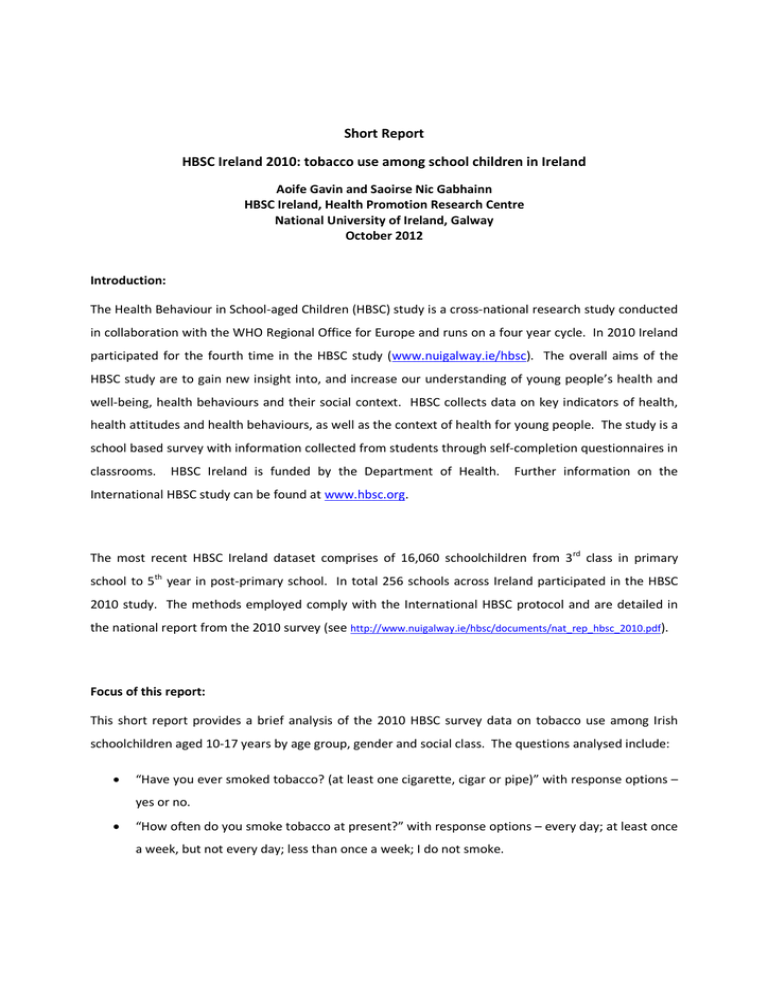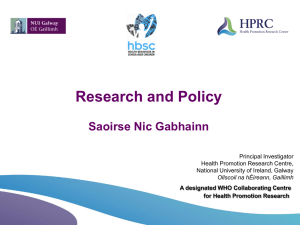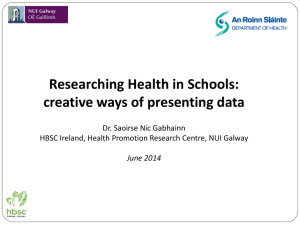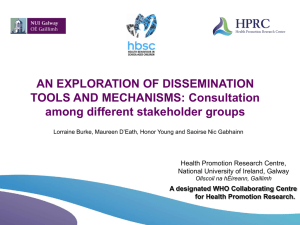Short Report
advertisement

Short Report HBSC Ireland 2010: tobacco use among school children in Ireland Aoife Gavin and Saoirse Nic Gabhainn HBSC Ireland, Health Promotion Research Centre National University of Ireland, Galway October 2012 Introduction: The Health Behaviour in School-aged Children (HBSC) study is a cross-national research study conducted in collaboration with the WHO Regional Office for Europe and runs on a four year cycle. In 2010 Ireland participated for the fourth time in the HBSC study (www.nuigalway.ie/hbsc). The overall aims of the HBSC study are to gain new insight into, and increase our understanding of young people’s health and well-being, health behaviours and their social context. HBSC collects data on key indicators of health, health attitudes and health behaviours, as well as the context of health for young people. The study is a school based survey with information collected from students through self-completion questionnaires in classrooms. HBSC Ireland is funded by the Department of Health. Further information on the International HBSC study can be found at www.hbsc.org. The most recent HBSC Ireland dataset comprises of 16,060 schoolchildren from 3rd class in primary school to 5th year in post-primary school. In total 256 schools across Ireland participated in the HBSC 2010 study. The methods employed comply with the International HBSC protocol and are detailed in the national report from the 2010 survey (see http://www.nuigalway.ie/hbsc/documents/nat_rep_hbsc_2010.pdf). Focus of this report: This short report provides a brief analysis of the 2010 HBSC survey data on tobacco use among Irish schoolchildren aged 10-17 years by age group, gender and social class. The questions analysed include: “Have you ever smoked tobacco? (at least one cigarette, cigar or pipe)” with response options – yes or no. “How often do you smoke tobacco at present?” with response options – every day; at least once a week, but not every day; less than once a week; I do not smoke. “At what age did you first smoke a cigarette (more than a puff)?” with the response options – never; 11 years or young; 12 years old; 13 years old; 14 years old; 15 years old; 16 years or older. “How frequently have you smoked cigarettes during the last 30 days” with the response options – not at all; less than 1 cigarette per week; less than 1 cigarette per day; 1-5 cigarettes per day; 6-10 cigarettes per day; 11-20 cigarettes per day; more than 20 cigarettes per day. Findings: Table 1: Percentage of young people who report that they have ever smoked by age, gender and social class SC 1-2 Boys SC 3-4 SC 5-6 SC 1-2 Girls SC 3-4 SC 5-6 SC 1-2 Total SC 3-4 SC 5-6 10 to 11 1.5 5.7 9.5 1.9 3.2 6.9 1.7 4.4 8.2 12 to 14 15.0 17.5 23.2 12.9 17.3 21.0 13.9 17.4 22.1 15 to 17 42.7 47.5 43.3 43.2 46.4 52.0 43.1 47.0 47.5 Table 2: Percentage of young people who report that they are current smokers by age, gender and social class SC 1-2 Boys SC 3-4 SC 5-6 SC 1-2 Girls SC 3-4 SC 5-6 SC 1-2 Total SC 3-4 SC 5-6 10 to 11 0.8 1.4 5.2 1.5 1.3 2.0 1.1 1.4 3.6 12 to 14 5.6 6.6 7.1 4.7 7.7 6.2 5.2 7.1 6.6 15 to 17 15.9 21.7 18.9 18.9 22.9 24.8 17.4 22.3 21.8 Table 3: Age of first cigarette by gender (for 15 to 17 year olds only) Never 11 or younger 12 13 14 15 16 or older Boys 57.9 6.6 6.0 7.6 9.4 8.1 4.4 Girls 54.7 4.9 5.2 7.7 12.0 10.2 5.2 All 56.4 5.8 5.7 7.6 10.6 9.1 4.8 Table 4: Percentage of young people who report that they smoked 6 or more cigarettes during the last 30 days by age, gender and social class SC 1-2 Boys SC 3-4 SC 5-6 SC 1-2 Girls SC 3-4 SC 5-6 SC 1-2 Total SC 3-4 SC 5-6 10 to 11 0.0 0.0 1.5 0.0 0.0 0.0 0.0 0.0 0.5 12 to 14 06 0.9 1.6 0.9 1.5 1.7 0.7 1.2 1.7 15 to 17 6.3 9.3 5.7 4.9 5.5 10.1 5.6 7.6 7.8 Acknowledgements: HBSC Ireland is funded by the Department of Health. This short report was requested by the National Cancer Control Programme. We would like to acknowledge the children and parents who consented and participated, the management authorities, principals and teachers who helped us to collect the data, the staff at the Health Promotion Research Centre, National University of Ireland Galway, the HBSC Ireland Advisory Board and the International coordinator of HBSC, Professor Candace Currie of the University of St. Andrews, Scotland. www.nuigalway.ie/hbsc. Further information on HBSC Ireland is available at


